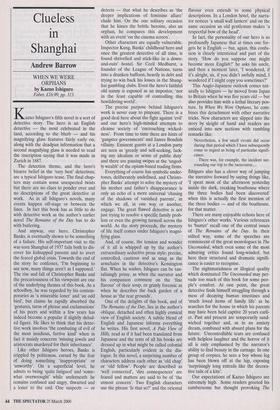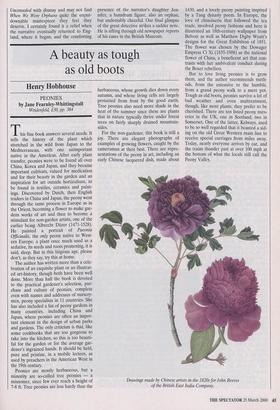Clueless in Shanghai
Andrew Barrow
WHEN WE WERE ORPHANS by Kazuo Ishiguro Faber, £16.99, pp. 313 Kazuo Ishiguro's fifth novel is a sort of detective story. The hero is an English detective — the most celebrated in the land, according to the blurb — and his magnifying glass features fairly early on, along with the deadpan information that a second magnifying glass is needed to read the inscription saying that it was made in Zurich in 1887.
The detection theme, and the hero's bizarre belief in the 'very best' detectives, are a typical Ishiguro tease. The final chap- ters may contain some unexpected twists but there are no clues to ponder over and no descriptions of the great detective at work. As in all Ishiguro's novels, many events happen off-stage or between the lines. In fact this book has as little to do with detective work as the author's earlier novel The Remains of the Day has to do with butlering.
And anyway, our hero, Christopher Banks, is eventually shown to be something of a failure. His self-important visit to the war-tom Shanghai of 1937 fails both to dis- cover his kidnapped parents and to avert the feared global crisis. Towards the end of the story he confesses, 'I'm beginning to see now, many things aren't as I supposed.' The rise and fall of Christopher Banks and the precariousness of his viewpoint are one of the underlying themes of this book. As a schoolboy, he was regarded by his contem- poraries as 'a miserable loner' and 'an odd bird', but claims he rapidly absorbed the 'gestures, turns of phrase and exclamations' of his peers and within a few years has indeed become a popular if slightly delud- ed figure. He likes to think that his detec- tive work involves 'the combating of evil of the most insidious, furtive kind' when in fact it mainly concerns 'missing jewels and aristocrats murdered for their inheritance'.
Like other Ishiguro heroes, Banks is crippled by politeness, cursed by the fear of doing something 'inappropriate' or 'unworthy'. On a superficial level, he admits to being 'quite fatigued' and 'some- what overwrought' while underneath he remains confused and angry, thwarted and a loner to the end. One suspects — or detects — that what he describes as 'the deeper implications of feminine allure' elude him. On the one solitary occasion that he kisses the brittle heroine, also an orphan, he compares this development with an event 'on the cinema screen'.
Other characters are equally vulnerable. Inspector Kung, Banks' childhood hero and once the greatest detective of all time, is found shrivelled and stick-like in a down- and-outs' hostel. Sir Cecil Medhurst, a founder of the League of Nations, turns into a drunken buffoon, heavily in debt and trying to win back his losses in the Shang- hai gambling clubs. Even the hero's faithful old nanny is exposed as an impostor, 'not in the least capable of controlling this bewildering world'.
The precise purpose behind Ishiguro's work is never easy to pinpoint. There is a good deal here about the fight against 'evil' and our hero's high-minded attempts to cleanse society of 'encroaching wicked- ness'. From time to time there are hints of 'gangster governments' and James Bondish villainy. Eminent guests at a London party are seen as 'greedy and self-seeking, lack- ing any idealism or sense of public duty' and there are passing swipes at the 'ungod- ly wealth' of the opium-based trading firms.
Everything of course has symbolic under- tones, deliberately undefined, and Christo- pher Banks' attempt to solve the mystery of his mother and father's disappearance is only an echo of a more universal 'chasing of the shadows of vanished parents', in which we all, in one way or another, engage. The great flawed detective is not just trying to resolve a specific family prob- lem or even the growing turmoil across the world. As the story proceeds, the mystery of life itself comes under Ishiguro's magni- fying glass.
And, of course, the tension and wonder of it all is whipped up by the author's extraordinary seductive prose style: precise, controlled, cautious and as snug as the armchairs in the detective's Kensington flat. When he wishes, Ishiguro can be tan- talisingly prissy, as when the narrator and his companion comment on the 'fine flavour' of their soup, or grimly forensic as when he describes the back garden of a house as 'the rear grounds'.
One of the delights of this book, and of The Remains of the Day, lies in the author's oblique, detached and often highly comical view of English society. A subtle blend of English and Japanese informs everything he writes. His first novel, A Pale View of Hills, read as if it had been translated from Japanese and the texts of all his books are dressed up in what might be called colonial English, particularly evident in the dia- logue. In this novel, a surprising number of characters address each other as 'old chap' or 'old fellow'. People are described as 'well connected', 'dire consequences' are feared and matters are said to be of 'the utmost concern'. Two English characters use the phrase 'Is that so?' and the oriental flavour even extends to some physical descriptions. In a London hotel, the narra- tor notices 'a small wall lantern' and on the same occasion an old gentleman makes 'a respectful bow of the head'.
In fact, the personality of our hero is so profoundly Japanese that at times one for- gets he is English — but, again, this confu- sion is clearly intentional and part of the story. 'How do you suppose one might become more English?' he asks his uncle, and then a moment later, 'I wondered, if it's alright, sir, if you didn't awfully mind, I wondered if I might copy you sometimes?'
This Anglo-Japanese outlook comes nat- urally to Ishiguro — he moved from Japan to Britain when he was five years old — but also provides him with a lethal literary pos- ture. In When We Were Orphans, he com- bines this detachment with other narrative tricks. New characters are slipped into the story by sleight of hand and readers are enticed into new sections with rambling remarks like:
Nevertheless, a few small events did occur during that period which I have subsequently come to regard as being of particular signifi- cance.
There was, for example, the incident sur- rounding our trip to the racecourse...
rshiguro also has a clever way of jumping the narrative forward by saying things like, 'I spent most of the afternoon yesterday inside the dark, creaking boathouse where the three bodies had been discovered' when this is actually the first mention of the three bodies — and of the boathouse, for that matter.
There are many enjoyable echoes here of Ishiguro's other works. Various references to 'banter' recall one of the central issues of The Remains of the Day. In their stilted way, some of the speeches are reminiscent of the great monologues in The Unconsoled, which even some of the most admiring critics found long-winded, but here their structural and dramatic signifi- cance is easier to recognise.
The nightmarishness or illogical quality which dominated The Unconsoled may per- vade too much of this book for some peo- ple's comfort. At one point, the great detective finds himself struggling through a mess of decaying human intestines and 'much loved items of family life' as he searches for the house in which his parents may have been held captive 20 years earli- er. Past and present are temporarily sand- wiched together and, as in an anxiety dream, combined with absurd plans for the future. Uncontrollable tears are confused with helpless laughter and the horror of it all is only emphasised by the narrator's ability to find beauty in the carnage. In one group of corpses, he sees a boy whose leg has been blown off at the hip, exposing 'surprisingly long entrails like the decora- tive tails of a kite'.
Our expectations of Kazuo Ishiguro are extremely high. Some readers greeted his cumbersome but thought provoking The Unconsoled with dismay and may not find When We Were Orphans quite the unput- downable masterpiece they feel they deserve. I certainly found it a relief when the narrative eventually returned to Eng- land, where it began, and the comforting presence of the narrator's daughter Jen- nifer, a humdrum figure, also an orphan, but undeniably cheerful. Our final glimpse of the great detective strikes a sadder note. He is sifting through old newspaper reports of his cases in the British Museum.



































































 Previous page
Previous page